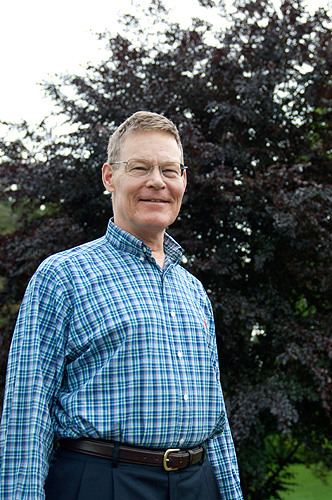
Professor Crawford (Tim) Elder’s new book – hot off Cambridge University Press – is a tough read, he admits.
“I feel sorry for the readers. I think I write like an angel, but it’s just a lot of hard work,” says Elder, head of the philosophy department in the College of Liberal Arts and Sciences.
The ideas he puts forth in Familiar Objects and Their Shadows are hard for the layperson to understand, and they fly in the face of mainstream metaphysics. To illustrate, you could say that some micro-particles fly very temporarily in front of what is not really a face. That’s because the prevailing thought is, what we call a face does not really exist. Composite objects, made of many parts, are impossible. Objects that endure for generations? Not there. Thoughts and desires? Illusory.
A book is not a book, it is sub-atomic particles that are arranged to look like a book. As Elder explains this theory, which he is not afraid to call “wacko,” he drops a large volume onto his desk with a convincing – or unconvincing – thud, depending on your philosophical stance.
Elder explains that his is a more common sense approach, which he believes can be supported by strong philosophical arguments that do not ignore the “fuzzy edges” of our world.
He calls himself a realist, because he believes in independently real objects. The prevailing view in metaphysics is a “poorly thought-out obsession,” he says. “Let’s take this more seriously and try to answer these philosophical problems.”
The problems are sticky because there are so many variants in how philosophers regard the reality, or unreality, of objects. We’re talking about “medium-sized” or everyday, familiar objects here, bigger than quarks, but smaller than the galaxy. Objects like trees, rocks, plants, or even people.
Elder once called a leading philosopher on the phone after the fellow wrote an article with the title, “I Do Not Exist.” When he answered the phone, Elder asked him, “So who am I talking to?” And the fellow answered, “Well, who are you, and what’s talking?”
This drive for accepting only what can be precisely described goes too far, Elder says, and is illogical. If you can only describe an object as micro-particles that are plant-wise arranged, he says, then you have lost the argument, since you had to use the idea of a plant in describing it. This is the “shadow” of the familiar object that he refers to in his book title, and it’s the Achilles’ heel of the prevailing view, he believes.
“I claim, all the stories they tell to explain these appearances covertly bring in the things they are trying to get rid of,” he says. “They have to invoke what they later dis.”
There’s more to the story – is there such a thing as rich or poor, for example, and how do you draw the distinction without losing it? If you take a penny away from Donald Trump, is he still rich? And if you keep removing pennies, at what point does he become poor? The messy edges of this problem defy precision, Elder says.
And, what makes a guy go to the refrigerator and take out a beer – because he wants one, as Elder maintains, or because his neurons sent him there, as many current metaphysics thinkers would maintain? This neuron-driven theory of mental causation is vexing, Elder says, because it ignores thoughts and desires.
Elder knows that he is part of what he calls a “small coterie” of thinkers in metaphysics who defend familiar objects, but even this group disagrees about how and why they exist. He expects to get “raked over the coals” (if they exist), as other philosophers read and respond to his ideas.
But he is happy that his latest book refines and strengthens ideas he put forth in an earlier book, and he hopes that the royalties will be enough to add another real object to his office: “Maybe I’ll be able to buy another espresso machine.”
Or, as his detractors would have it, a collection of quarks arranged to appear to be an espresso machine.



